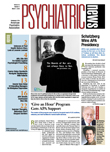Maryland's Department of Health and Mental Hygiene has started work on a plan to help the public recognize symptoms of mental health problems and learn how to approach and assist affected individuals.
The plan is based on an Australian program called Mental Health First Aid, developed by Betty Kitchener, M.Nurs., and Anthony Jorm, M.Psychol., Ph.D., D.Sc., now of Orygen Youth Health, affiliated with the Department of Psychiatry at the University of Melbourne. In Australia the two have taught members of the public, trained professionals for the program, and published several studies of outcomes, including at least one randomized, controlled trial (Psychiatric News, May 16, 2003).
“Mental Health First Aid is like a CPR course, a population-based intervention to help the public recognize the symptoms of mental illness and get people into treatment while reducing stigma,” Daryl Plevy, J.D., project director for Maryland's mental health transformation grant program, told Psychiatric News.
Kitchener and Jorm found that few Australians have the skills to support persons with mental health problems. Their 12-hour course “teaches the symptoms, causes, and evidenced-based treatments for the common mental health problems of depression, anxiety disorders, psychosis, and substance use disorder,” they explain on their program Web site. They address crisis situations arising from mental health problems but emphasize that early recognition, intervention, and support may head off such crises.
The two have trained over 450 instructors in Australia, many in rural areas, where mental health services are in as short a supply as they are in the United States.
The first aid program came separately to the attention of John Colmers, M.P.H., and Brian Hepburn, M.D. After incoming Gov. Martin O'Malley named Colmers secretary of the Maryland Department of Health and Mental Hygiene in January 2007, and Hepburn became executive director of the state's Mental Hygiene Administration, the two decided to take a closer look at the program.
Early in January, Kitchener and Jorm came to Maryland and presented elements of the general and the training versions of their program to representatives of local mental health governing authorities and chapter representatives of the Mental Health Association of Maryland, said Plevy. The goal was to evaluate the program's applicability for an American setting. Evaluators from Maryland and Missouri are studying whether the Australian data are comparable to U.S. findings. They must also convert referral information and some terminology from Australian usage to American English.
That phase of the conversion is nearly complete, and the evaluators will next move on to certification issues, said Plevy. So far, Kitchener and Jorm have trained and certified trainers, but any expansion in this country will depend on deciding who will be trained, what they need to know, how to maintain the quality of training, and how to update the knowledge of course graduates.
If all goes well, the combined Maryland/Missouri evaluation will be submitted to the Substance Abuse and Mental Health Services Administration for distribution in this country.
“It's too early to predict when a final version will be ready, but the program has enormous potential,” said Plevy.
Details of the Australian Mental Health First Aid program are posted at<www.mhfa.com.au/index.shtml>.▪
